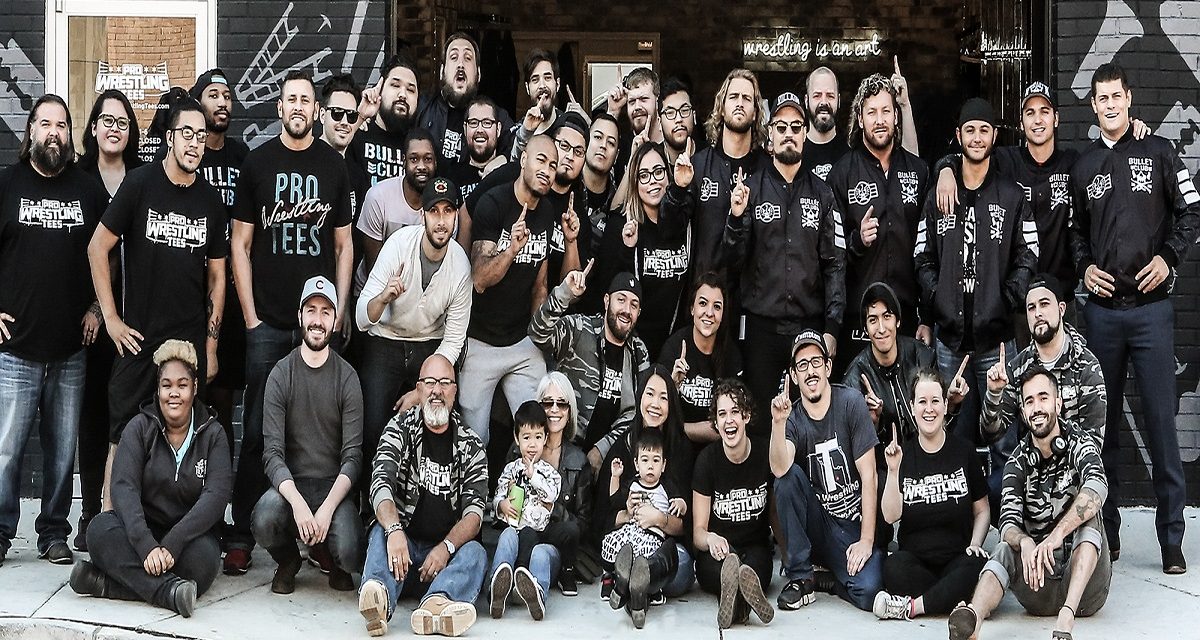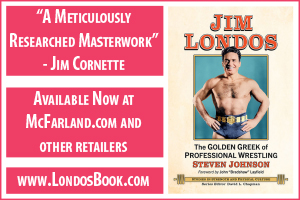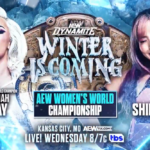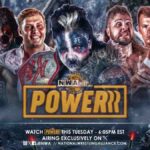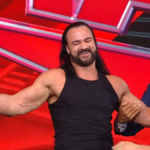Pro Wrestling Tees: Behind the Merch is the short documentary you never knew you needed, about the business you never knew you needed either, but both are well worth checking out. Ryan Barkan, owner and operator of OneHourTees.com and ProWrestlingTees.com, has produced a short documentary under the direction of Cristian Coronado that pulls back the curtain on his business, provides some serious name-dropping and testimonials from big-name wrestling industry workers, and threads a fine line between infomercial and behind-the-scenes interest movie.
The history of ProWrestlingTees.com has been covered previously on Slam Wrestling by Caleb Smith; and while you should read that article here as a partner to this one, here are the Coles Notes on how the t-shirt empire got its start.
Barkan, a childhood wrestling fan from Chicago, opened up a t-shirt print shop in the late 2000s that employed his brother, sister, and mother to help get it off the ground. His original target demographic consisted of schools (for teachers that would want custom made shirts for student events) and local sports teams.
The business grew, Barkan opened a retail store, and started displaying advertisements around the city. Colt Cabana (referred to in the documentary as the King of Merchandise) approached him with an idea to provide an avenue for independent wrestlers to create and sell their own products, while opening up a new world of advertisement and networking for Barkan.
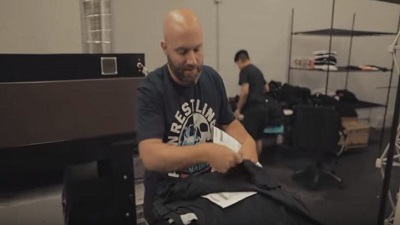
Ryan Barkan processing an order for Pro Wrestling Tees.
A mutually beneficial partnership was struck, and here we are with a short film about the little business that could. Barkan spoke with Slam Wrestling after the doc’s release on YouTube to discuss the reasons for making the film, the simple edict of his future business goals, and whether or not he is a workaholic.
“Man, if we get 30 wrestlers to sign up and each wrestler sells one shirt a day, we’d be at nine hundred shirts a month and that would be huge,” Barkan explains in the video, looking back to the early, uncertain days of augmenting his One Hour Tees business with a side-business dedicated to wrestling.
“Last month we sold 25,000 shirts.” The business model has worked.
The film parades an impressive list of wrestling industry workers vouching for both Barkan’s product and his professionalism. Cody Rhodes, Colt Cabana, Jim Ross, The Young Bucks, Diamond Dallas Page, and many more seem eager to express their satisfaction with the creative outlet and business income that Pro Wrestling Tees has provided for them.
Each one also makes sure to take a moment to express that their personal relationship with Barkan is as important to them as their professional connection. The documentary furthers the connection between Barkan and the wrestling workers to encompass the fans, and keeps strengthening those connections throughout the film.
Barkan, for his part, lists the fans, his customers, as the main reason for creating this film in the first place. “We wanted to give the fans a behind-the-scenes look at the process,” he says over the phone. “A lot of people presume we have a warehouse and pull an order off the shelf, but we are an on-demand workshop.”
The middle part of the film is dedicated to this process, as Barkan picks up an active order, walks through the team responsible for processing, then producing, then sorting the request, with his still relatively small crew each playing their part with what has become experienced precision.
Small but mighty could be his workforce’s motto. “There might be 40 of us here, and some other stores have 80 to a 100 employees, but we have worldwide reach,” he explains, reasoning that there’s a tight-knit feel to his crew that helps everyone perform at a high level. “Everyone who works here are friends. There are 25 of us going on the Chris Jericho cruise.”
Barkan details how this connection between employees has another benefit when it comes to the design strategy for Pro Wrestling Tees: “A lot of the people that work here are former customers, so we’re making shirts that we want to wear.”
Barkan’s role has evolved, of course, since the early business days when he was essential to every aspect of the operation. “My focus is the creative design and Pro Wrestling Crates,” he explains, referencing another merchandising aspect of his store. “I source all the products and reach out to wrestlers for approval, but I can do everything. I had to print shirts during Black Friday and then I sorted shirts. I like to do everyone’s job.”
This is where the workaholic tag comes in. It’s applied to Barkan in the film by Matt Jackson. Barkan responds over the phone to this tag with a “yes and no” answer: “I still have time for family and friends,” he says. “But when I work, I work hard.”
This mindset, simple in theory, is part of what has built a system of trust with the wrestlers he works with. This makes the process of designing shirts easier, since a connection of understanding lets him anticipate what a wrestler will likely want out of a shirt design. “At this point most of the wrestlers trust me and my creative direction,” he acknowledges. “If I’m working with Jericho I know what he’s done in the past, so 80 to 90 percent of the time he’ll approve it right off the bat. Most wrestlers are pretty creative, as they’ve already created a character, so we take that and put into a design. Sometimes I’ll ask them to look through our site so I get a sense of their style — grunge, textured, or cartoony.”
Again, the film has no shortage of workers who praise the opportunities that Pro Wrestling Tees afforded them. The Blue Meanie discusses how much work it was to move his own merchandise in the 1990s, when his best outlet was eBay, which meant maintaining his own stock and running his own shipping business. Kevin Steen/Owens, the lone current WWE star who gets a clip in this film, describes how Pro Wrestling Tees in no small part helped change his fortunes as an independent wrestler.
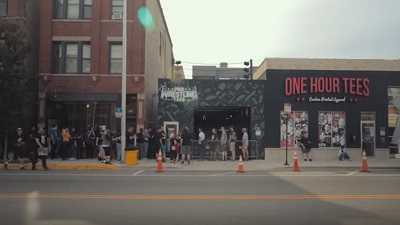
Lines form outside of the One Hour Tees and Pro Wrestling Tees stores in Chicago.
Cabana, the original voice of support for Barkan and his business, boils it down to a simple credo offered by Pro Wrestling Tees: “We always take care of the wrestlers.”
The third cog in this wheel, as mentioned before, is the fanbase, which Barkan labels as unique in terms of passion and loyalty. “They are more passionate than any fan for anything, for any TV show,” he says over the phone. “You don’t see people running out and lining up to buy shirts for TV shows or even sports. They want to support the wrestlers, and they know the wrestlers need the support through the merchandise.”
It follows, then, that the fans get a voice in this film. As did the wrestlers themselves, fans loyal to Pro Wrestling Tees provide snippets about how much the easy access to a wide variety of merchandise means to them, and the appreciation is then returned by wrestlers thanking the fans. In the middle of this is Barkan. While it is obviously ultimately beneficial to his own business, he is pleased with the role he plays in connecting the fans to the wrestlers they love.
The film shows sequences of long lines forming down the street just to get into the store in Chicago, but Barkan says that kind of crowd can be counted on when there’s an event at the store or an event in town; otherwise the location has more to do with the need for space to store their merchandise, especially their wrestling crates, than with the operation of a shirt sales location. “I don’t think we would have done it as a standalone business,” he admits. “It’s not as busy as people think. During the week we might get only four customers, but around an event 1,000 people show up.”
That is, however, the whole point of Pro Wrestling Tees: a thriving online business that is supplemented by the notoriety of a physical location. That may not sound so unusual, but it really is the inverse of the burgeoning days of on-line retail, when in-person transactions were king and an on-line presence existed to drive people to the store.
With his family no longer as involved in running the business, and only his mother remaining in the fold, Barkan feels comfortable in having created an enterprise than can run itself, with one eye always on improvements. In fact, he sets himself one simple (but not simplistic) business goal for each year: “Make one more dollar than the year before,” he states. To do that, he constantly seeks improvements in the business model and networking opportunities for new clients.
As shown in the documentary, his list of clients is already expansive across circuits and legends. Still, there are always new opportunities coming up (such as his deal with AEW) and maybe a dream client or two. “I would love to work with Sting,” he says. “There are certain people you can probably never work with, like Undertaker and Cena. Sting would be great.”
If the wrestlers and fans featured in the video have any say, Barkan’s emporium will be around long enough and reach far enough to eventually score him anyone that ends up within his reach.
WATCH THE DOCUMENTARY
RELATED LINKS
